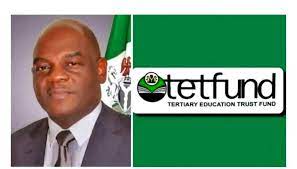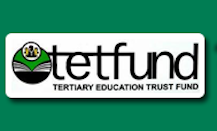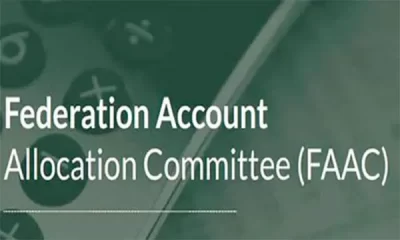COVER
TETFund Records Over N60bn Revenue Decline-Echono

By Evelyn Terseer, Abuja
The Tertiary Education Trust Fund (TETFund) said it has recorded over N60 billion decline in revenue available for its operations.
TETFund executive secretary, Sonny Echono disclosed yesterday in Abuja when members of the House of Representatives Committee on Tertiary Education and Services, led by Hon Aminu Suleiman, paid an oversight visit to the agency.
Echono, while speaking on the operations of the Fund and the state of finances, especially from 2017 to date said last year’s collection, which is what the Fund used to operate this year, dropped to N189 billion.
“We witness a steady rise in collections under the education tax but unfortunately, last year, for the 2021 there was a sharp drop and that left us in a very dare position.
“For example, as I said, from N154 billion in 2017, the tax collection rose steadily to N257 billion over the years.
“So by 2020, we’ve got N257 billion, but unfortunately, last year’s collection, which is what we use to operate this year, dropped sharply to N189 billion.
“So over N60 billion drop revenue or resources available to TETfund and the way we operate, 2021 collections are used for 2022 operations,” the TETfund boss said.
However, he noted that given Mr president’s commitment on increased funding for education, and with the usual support of the National Assembly, the tax rate last year was increased from 2 to 2.5%.
“But the target is that before the end of this administration, it will increase to three per cents, which is a commitment that the President has already given in writing the global community to the Global Partnership for Education.”
Echono further commended the level of support and cooperation the Fund has enjoyed from the committee and the National Assembly, while seeking its support in effecting the amendment of the Fund.
“This is a major area that will be seeking the support of the National Assembly in terms of legislation.
“The other aspect is the fact that in contravention of this oversight, we also want to open our activities more to independent assessment and evaluation on our behalf.
“So we have designed a monitoring and evaluation that will be involving key stakeholders, like the National Assembly, even the staff unions in our tertiary institutions, to join us do independently look at some of the things that we’re doing,” he added.
Responding, Suleiman assured the Fund of its continued support and cooperation to ensure that the system continue to work stronger.
“We congratulate you and we assure you of our support, without prejudice to the fact that sometimes we can agree to disagree.
“And I’m sure you are familiar we have had quite several even when you are the Permanent Secretary to disagree entirely with the ministry, but not predicated on any personal motive but to share with you where I’m at with them differently from the way things are being done, and in most cases, we actually arrive at the surface.
“I have no doubt that our relationship will continue here. The essence is for us like I said to better the system.”
He said the visit was a legislative requirement on any legislatures through various committees that a minimum of an oversight must be conducted and the periodic report submitted to the house through the culinary bureaus to discuss matters, particularly challenges that agencies and monitors of those agencies are facing.
He also directed TETFund to mandate state institutions benefiting from its interventions to submit reports of their operations within three weeks.
Suleiman said, “For about four or five months we have written to the Fund asking them to invite the attention of state institutions who are benefiting from the Tetfund operations to send to the committee their statement of operations as thy relates to what they have been getting fr to om TETFund.
“We do not know whether is TETfund that has not communicated to the institutions or they have not followed up on all or the institutions felt that they state institution and they are not responsible to us.
“If they didn’t they should stop funding them because they cannot collect public fund and refused to account for it, impossible, they have to account.
“If they refuse to account because they are state institutions then they should go back to the state governors and get funding which is even the right thing that is supposed to be done.
“TETFUND is supposed to be assisting but we have a situation where every governor now set up an institution and abandon it to TETfund for funding except salaries.
“I use this opportunity to advise that bodies responsible for these should ensure that within three weeks all the state’s institution complied if they did not the committee will decide whether they are entitled to continue to benefit from succession that is under the control of TETfund,” he added.
COVER
NUPRC Sets 2026 Oil Output Target at 2.5m Barrels Daily

The Nigerian Upstream Petroleum Regulatory Commission (NUPRC) said the country is on track to achieve a crude oil production target of 2.5 million barrels per day by 2026.NUPRC Chief Executive, Gbenga Komolafe, said this yesterday in Abuja during the 4th PENGASSAN and Labour Summit (PEALS 2025).
The summit was themed “Building a Resilient Oil and Gas Sector in Nigeria: Advancing HSE, ESG, Investment and Incremental Production. ”He noted that Nigeria’s current oil output had increased from 1.46 million barrels per day in Oct. 2024 to 1.8 million barrels per day, with momentum building toward the 2026 target.He credited the recent Presidential Executive Orders under the Petroleum Industry Act (PIA) 2021 for shortening contracting cycles, reducing investment risks, and encouraging upstream projects.Komolafe highlighted the commission’s efforts in deepwater exploration, reactivation of dormant fields, and adoption of enhanced recovery techniques.He also referenced a recent Deepwater Technical Stakeholders’ Workshop, which focused on unlocking more than 810,000 barrels per day in new production.He outlined a cluster development strategy aimed at reducing costs, sharing infrastructure, and strengthening investor confidence.On sustainability, Komolafe said the NUPRC’s Upstream Decarbonisation Framework targeted the elimination of routine gas flaring by 2030 and a 60 per cent reduction in methane emissions by 2031.Nigeria’s 210 trillion cubic feet of gas reserves, he added, would play a key role in the energy transition.He called for stronger collaboration between government, industry, and labour, stressing that resilience in the sector must be a deliberate effort.Managing Director of ExxonMobil, Jagie Baxi identified four critical factors for boosting Nigeria’s oil production: geology, cost, risk, and reward.He warned that in spite of Nigeria’s vast hydrocarbon resources, natural production decline, especially in deepwater operations, remained a challenge, with operators losing about 15% per cent output annually.Baxi noted that high drilling and operational costs in Nigeria deterred fresh investment.He stressed the need for risk-adjusted incentives to retain investor interest and urged improved collaboration among stakeholders to resolve disputes and revive underperforming fields. (NAN)COVER
Voter Registration:Northern CAN Mobilises Christians for Turn Out

By David Torough, Abuja
The Christian Association of Nigeria (CAN) in the 19 Northern states and the Federal Capital Territory (FCT) has urged Christians to seize the ongoing Continuous Voter Registration (CVR) exercise by the Independent National Electoral Commission (INEC) as an opportunity to prepare for active participation in the 2027 general elections.
In a statement by its Chairman, Rev. Yakubu Pam, Northern CAN described voter registration as both “timely and crucial,” stressing that obtaining a Permanent Voter’s Card (PVC) remains the gateway to effective participation in the democratic process. “As responsible citizens and followers of Christ, we have a moral and civic duty to contribute meaningfully to the future of our nation. Democracy thrives when the voices of the people are heard. We must not sit on the sidelines,” Rev. Pam stated.He called on Christians of voting age, especially first-time voters, those who have relocated, or those yet to register, to turn out en masse for the exercise, adding that silence or indifference only empowers “the wrong forces to take control of the destiny of our nation.”The statement further urged churches, Christian organisations and community leaders across the North to mobilise their members for the registration, emphasising that the 2027 elections will be a defining moment for Nigeria.Meanwhile, INEC has clarified that the approved voting age under the Electoral Act remains 18, stressing that persons below that age cannot register even if they would have turned 18 by 2027.At separate engagements in Yobe and Sokoto states, Resident Electoral Commissioners (RECs) assured citizens that the CVR will be conducted smoothly, with security agencies fully mobilised to provide safety in identified flashpoints.INEC also restated that both online and physical registration will run for one year, targeting new voters, those with invalid PVCs, and citizens seeking transfers or corrections of details, while warning against multiple registrations.COVER
Nigeria’s External Reserves Hit $41bn, Highest in 44 Months

By David Torough, Abuja
Nigeria’s external reserves have surged to a four-year high of over $41 billion, a development the Presidency has hailed as a major economic milestone while taking a swipe at opposition leaders; Atiku Abubakar, Peter Obi and Nasir El-Rufai.According to the Central Bank of Nigeria (CBN), the gross reserves stood at $41,001,830,139.
96 as of August 19, 2025, with net reserves at $40. 3 billion, a level last seen in 2021, 44 months ago. Presidential spokesman Bayo Onanuga in a post on his official X handle yesterday described the achievement as evidence of “Prudent economic management” under President Bola Tinubu, adding that the increase was attained despite falling global oil prices.“The latest milestone was reached without massive inflows from oil sales. It’s all about the prudent management of the economy by President Bola Tinubu,” Onanuga wrote on X, noting that opposition leaders were unlikely to acknowledge the progress.He accused Atiku, Obi, El-Rufai and Babachir Lawal of being “blinded” by what he called a “doomed campaign to discredit Tinubu’s government.”The rise in reserves has been attributed to increased foreign exchange inflows, modest crude oil output gains, and recent CBN reforms, including the unification of exchange rate windows that boosted investor confidence.According to a report, the reserves’ strength now provides cover for more than 10 months of import needs, bolstering Nigeria’s foreign liquidity position.




















